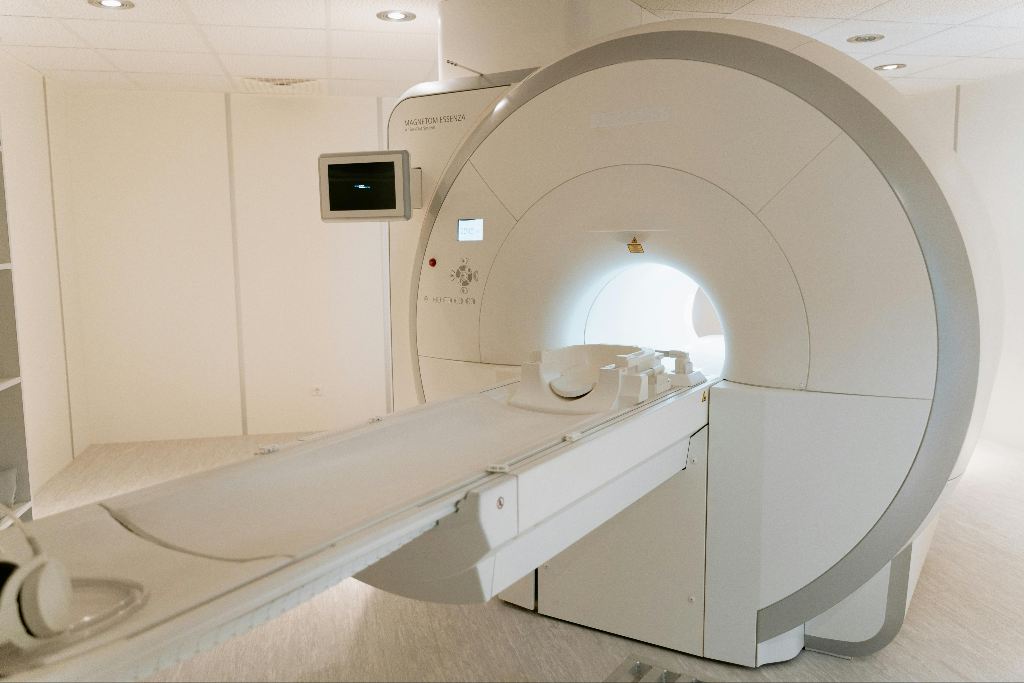Many individuals who are scheduled to have an MRI struggle with understanding what to expect. The typical connotation of this exam from television and books is that it is confining and stress-inducing.
Here, we’re going to address your concerns and misconceptions about imaging technology, so you can safely and confidently undergo this procedure at one of our Atlanta MRI centers.
What Is an MRI?
MRI (magnetic resonance imaging) is a diagnostic tool used by doctors in confirming the presence or progression of an illness or injury. MRIs specifically function with the use of magnetic fields and radio waves.
This technology is able to generate images that show the radiologist interpreting them the anatomy of the patient and the way different physiological functions are being performed by the body at present. These images are placed together in a composite to give a fuller impression of parts of the anatomy. Many doctors prefer MRI scans to CT scans or X-rays for a variety of reasons.
First, MRIs are able to translate images with a great deal of detail, which provides a high resolution and very accurate picture of oftentimes difficult to discern images. It is a favorite when it comes to diagnosing soft tissue injuries and disorders.
Additionally, it is a safer scan in reference to the fact that it exposes the patient to zero radiation in the process of conducting the MRI. For those with concerns about the risks of radiation, this can be comforting news.
Who Needs an MRI?
Those who require an MRI scan generally have some type of injury, disorder, or brain abnormality that will be assessed and visualized using MRI technology. Doctors will prescribe this diagnostic test if they:
- want to see and understand an injury better
- need to monitor a chronic or degenerative illness
- map the way the brain is functioning for the purposes of treatment or research
What Will an MRI Scan Be Like and What Are Some Tips For the Exam?
First, it is important to note that your doctor or the medical professional conducting the MRI examination will make sure you have all the necessary information in order to safely undergo the test.
Hopefully, having access to the information in advance of your exam will allow you to maintain peace of mind if you are at all nervous or concerned about your MRI.
- You will not feel any of the magnetic fields or radio waves enter your body as the test is performed.
- You will be provided with a hospital gown in order to mitigate the risk of any magnets on clothing or jewelry interfering with the scan.
- You can expect your scan to last anywhere from 45 minutes to one hour
- The exam is painless, but it does exhibit loud clanging noises as it operates. Should you feel uncomfortable at any time, you will have access to a two-way audio monitor in order to speak with the person performing your test.
- If you are concerned related to claustrophobic tendencies, keep in mind that the magnetic field is closed, but that the machine contains lights and a fan in order to reduce your discomfort. If you suspect you will still have difficulty undergoing the test, consult with your doctor about the possibility of sedation during your MRI.
- Make sure your doctor is apprised of any metal objects which may interfere with your MRI scan. These can include pacemakers, insulin pumps, artificial valves, cochlear implants, prosthetics, and several other types of metal implants. Knowing about the presence of these objects can allow your doctor to take the necessary precautions or modify your exam in order to keep you safe.
No matter what your expectations may be, particularly if this is your first MRI scan, you should keep in mind that this form of diagnostic imaging test is safe when administered correctly, and can be incredibly helpful in the diagnosis and treatment of whatever you are suffering from.
The experts at AICA Orthopedics conduct these tests all the time and will be happy to put your mind at ease. We can arm you with the information and peace of mind you require to undergo your MRI with ease. Contact our offices today to schedule your MRI scan!





